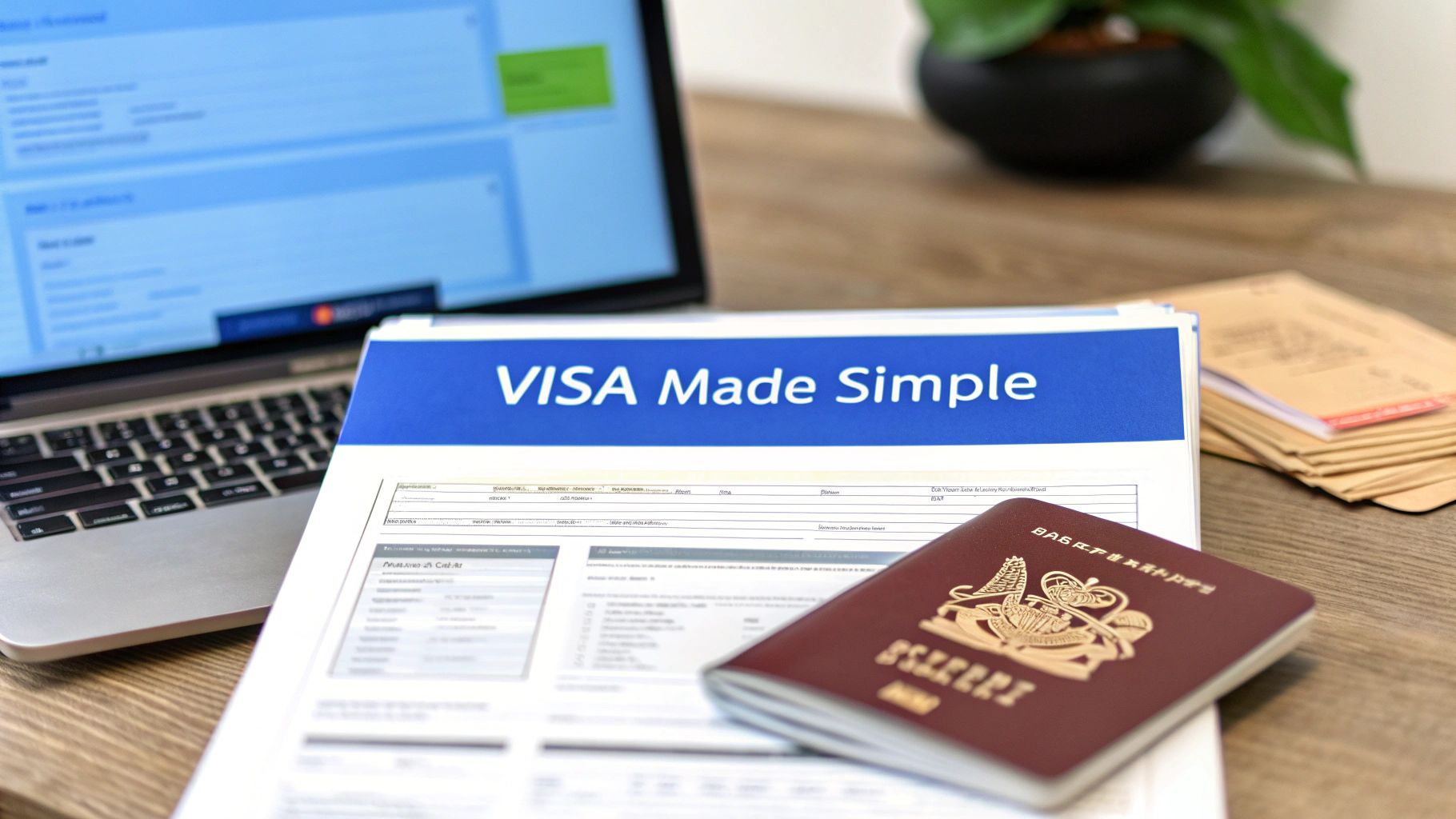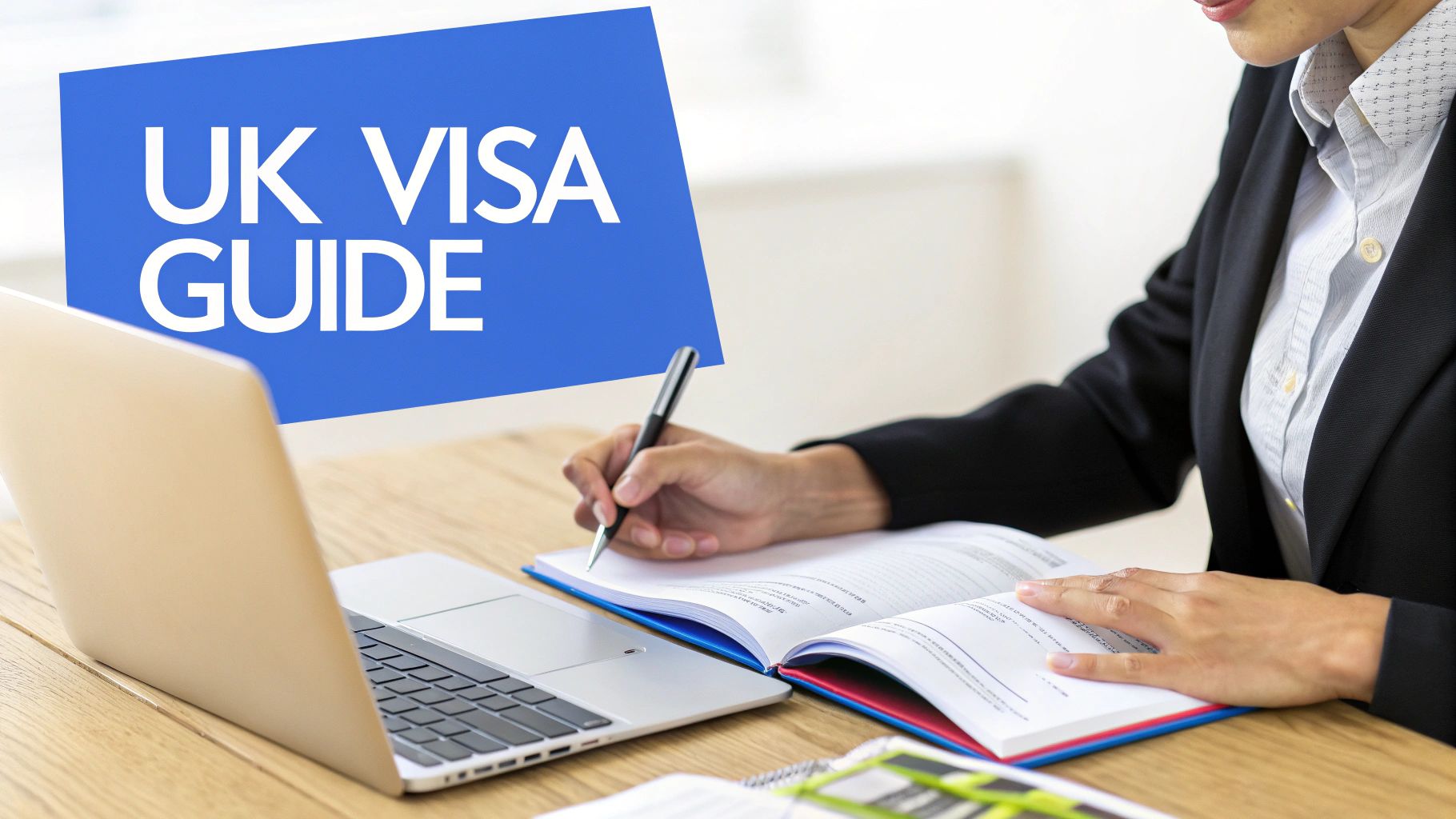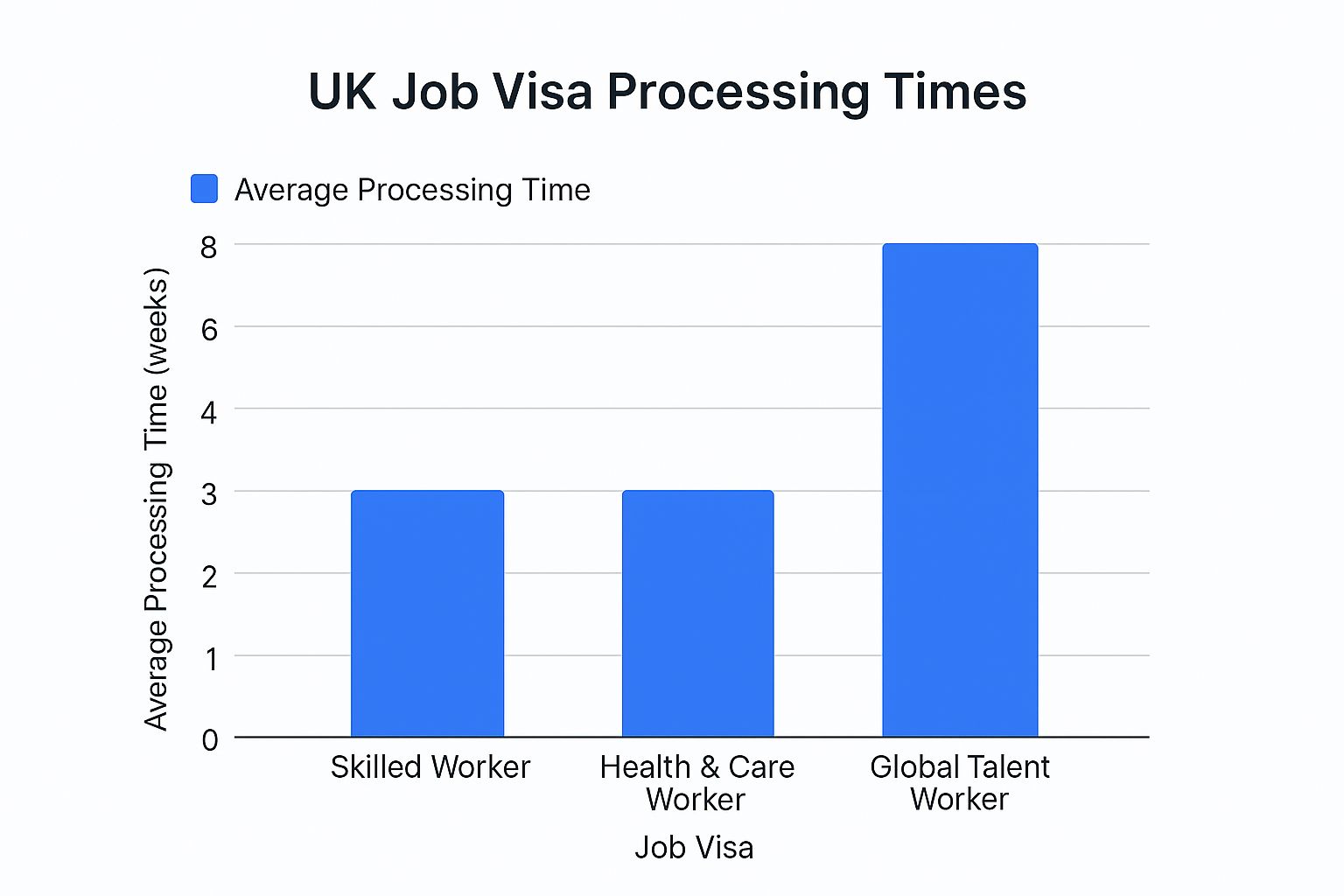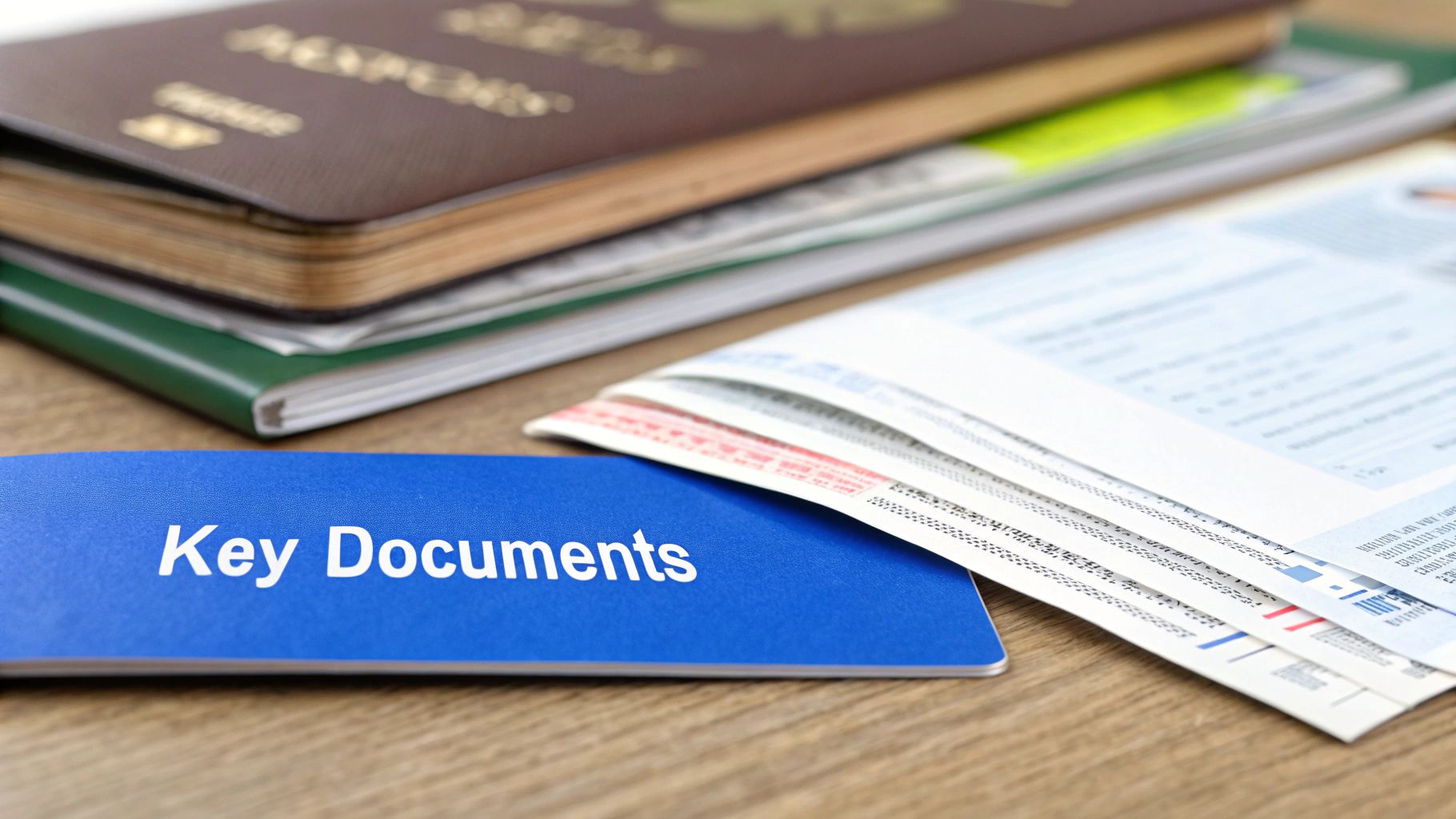UK Job Visa Requirements Simplified

Getting a UK job visa usually boils down to meeting the Skilled Worker visa requirements. At its core, this means you need a sponsored job offer from a licensed UK employer, you must be paid a certain minimum salary, and you have to prove you can speak English. It’s like a checklist—tick these three main boxes, and you’re well on your way.
Understanding the UK Job Visa Landscape

Trying to figure out the UK's immigration system can feel like learning a new language, full of specific jargon and intricate rules. But once you grasp the basic principles, the whole process becomes a lot less daunting. The system is set up to welcome professionals who can genuinely contribute to the UK economy, with the Skilled Worker visa serving as the primary route for most international talent.
Imagine the visa system as a series of gates. To get through each one, you need the right key. For the majority of people looking for work, these "keys" are a combination of a solid job offer, the right skills for the role, and a good command of English. This setup helps ensure that people coming to work in the UK are a great match for the country's job market.
The Points-Based System Explained
The UK job visa requirements are built around a points-based system. It sounds more complicated than it is; it's really just a straightforward way for the government to score your application and see if you qualify. You need to score 70 points in total. Some of these points are mandatory (non-negotiable), while others are "tradeable," which gives you a bit of flexibility.
Here's a quick look at the main visa routes to give you an idea of the landscape.
Key UK Work Visas at a Glance
This table offers a snapshot of the most common work visas, helping you see where you might fit in.
| Visa Type | Primary Purpose | Essential Prerequisite |
|---|---|---|
| Skilled Worker Visa | For professionals with a job offer in an eligible skilled role. | A Certificate of Sponsorship (CoS) from a Home Office-licensed employer. |
| Health and Care Worker Visa | A dedicated route for qualified doctors, nurses, and other health professionals. | A job offer from the NHS, an NHS supplier, or in adult social care. |
| Global Talent Visa | For recognised or potential leaders in academia, research, arts, or digital technology. | An endorsement from an approved body in your specific field. |
These visas are more popular than ever. The Home Office originally estimated it would grant about 360,000 Skilled Worker visas in the three years after 2020. In reality, they granted 931,000—more than two and a half times what they predicted.
Getting Ready For Your Move
Understanding the visa process is a huge step, but it's just one piece of the puzzle. While this guide focuses on the visa itself, anyone planning a big move will find broader guides on preparing for your move abroad really useful.
The secret to a successful application is realising the visa isn't just a piece of paper. It's a testament to the professional value you bring to the UK. This means preparing meticulously, from landing your sponsorship to gathering every last bit of evidence.
It's also worth remembering that the UK immigration landscape changes. You have to stay on top of any new rules that could impact your application. For a complete summary of the latest updates, take a look at our guide on the https://blog.japachat.com/uk-immigration-new-rules/. Having this foundational knowledge gives you a clear roadmap, helping you move forward with confidence toward your career goals in the UK.
The Four Pillars of Skilled Worker Visa Eligibility

When it comes to getting a Skilled Worker visa, your application rests on four key pillars. Think of it like building a house – if any one of the foundations is weak, the whole structure could come tumbling down. A successful application is one that firmly proves you meet every single one of these core UK job visa requirements.
Getting these essentials right from the very beginning is the secret to a much smoother process. Let's walk through each one so you can build a rock-solid case for your visa.
Pillar 1: Your Certificate of Sponsorship
The first, and arguably most important, pillar is your Certificate of Sponsorship (CoS). This isn't a paper document you hold in your hand; it's a unique digital reference number. Your UK employer, who must be licensed by the Home Office to sponsor international workers, is the one who provides you with it.
Think of the CoS as your golden ticket. It's the official confirmation to the Home Office that you have a genuine job offer from a legitimate, approved company. Without this number, you can't even start your application. It’s the key that unlocks the entire visa journey.
Pillar 2: An Eligible Job Offer
It's not enough to just have any job offer. The role itself has to meet a specific skill level set by the UK government. There's an official list of eligible occupations, and each one has its own four-digit code. Your job has to be on that list.
Generally, these are roles that require qualifications at least equivalent to A-levels (or a Nigerian equivalent, like the West African Senior School Certificate). This is how the government ensures the visa route attracts professionals who are filling specific gaps in the UK workforce.
Key Insight: The job title your employer gives you isn't what matters most to the Home Office. They'll look at the actual duties and responsibilities of your role to see if they match the official description for that occupation code.
For example, a job called "Marketing Executive" might fit perfectly under the "Marketing Associate Professionals" code. However, a role as a "Shop Assistant" almost certainly wouldn't meet the required skill level. Understanding this difference is absolutely crucial.
Pillar 3: The Minimum Salary Threshold
The third pillar is all about money. You need to show that your salary meets a minimum threshold, proving you'll be making a solid economic contribution. This is one of the most important UK job visa requirements and one where many people get tripped up.
Your salary will be checked against three main figures, and you must meet whichever one is the highest:
- The general salary threshold, which is currently £38,700 per year.
- The specific "going rate" for your job's occupation code.
- A minimum hourly rate of £15.88.
Let's say the general threshold is £38,700, but the official going rate for your specific job is £42,000. Your salary must be at least £42,000. For a closer look at how these rules affect applicants from Nigeria, have a read of our UK visa requirements for Nigerian citizens guide.
Pillar 4: English Language Proficiency
Finally, you have to prove you can communicate well in English. This is the fourth and final pillar holding up your application. The good news is that there are a few different ways you can tick this box.
How to Prove Your English Skills
- Citizenship: You're a citizen of a majority English-speaking country (like the USA, Australia, or Canada).
- English-Taught Degree: You have a degree (Bachelor's, Master's, or PhD) that was taught in English. If you earned it outside the UK, you'll likely need a confirmation from a service called Ecctis.
- Language Test: You pass a Secure English Language Test (SELT) from an approved provider, hitting at least a B1 level in reading, writing, speaking, and listening.
- UK School Qualification: You already have a GCSE, A level, or Scottish Higher in English from your time studying in the UK.
Nailing all four of these pillars is non-negotiable. If you can confidently show you have a valid CoS, an eligible job, a qualifying salary, and the right English skills, you're laying the best possible foundation for a successful visa application.
Cracking the Code: The 70-Point System
At the heart of the Skilled Worker visa process is a points-based system. It might sound a bit like a game, but it's really a straightforward checklist. To get your visa, you need to score 70 points – no more, no less. Think of it as hitting a specific target; getting extra points doesn't help, but falling even one point short means your application won't succeed.
The system is split into two main chunks: 50 foundational, non-negotiable points and another 20 "tradeable" points where you have some flexibility. Getting to grips with how to secure all 70 is your key to a successful application.
The 50 Mandatory Points: Your Foundation
First things first, let's talk about the essentials. These 50 points are the bedrock of your application. You can't swap them or make up for them in other areas. They prove you meet the core criteria for a skilled job in the UK.
You’ll lock in these foundational points by proving three things:
- You have a job offer from a Home Office-approved sponsor (20 points).
- The job is at an appropriate skill level (generally equivalent to A-levels) (20 points).
- You meet the B1 English language requirement (10 points).
Nail these three, and you're already at 50 points. This part is black and white; without these, an application is a non-starter. The real strategy kicks in when you need to find the final 20 points.
Finding Your Final 20 Tradeable Points
This is where the system offers a bit of wiggle room. To get from 50 to the magic number of 70, you need to earn another 20 points from a list of what the Home Office calls "tradeable" characteristics. For most people, it all comes down to salary.
The most direct route is to have a salary that's both at least £38,700 per year and the going rate for your specific occupation. If your salary hits this benchmark, you get your 20 points. Simple as that.
But what if your salary doesn't quite reach that level? This is where the "tradeable" options come in handy.
For instance, if your job is on the Immigration Salary List (a government list of roles with staff shortages), the salary threshold drops. You could secure your 20 points with a salary of at least £30,960. It’s always worth checking if your job is on this list, as it’s a game-changer for many applicants.
Other paths to getting those 20 points include:
- Holding a relevant PhD: If you have a PhD in a field directly related to your job, you can earn 20 points with a salary as low as £34,830.
- Being a "new entrant": This category is for those under 26 or recent graduates. New entrants can meet the requirement with a salary of at least £30,960.
To make it crystal clear, here’s a breakdown of how the points add up.
How to Score Points for a Skilled Worker Visa
This table shows exactly how you can accumulate the necessary 70 points, separating the mandatory requirements from the flexible, tradeable ones.
| Characteristic | Points Awarded | Is it Tradeable? |
|---|---|---|
| Job offer from an approved sponsor | 20 | No (Mandatory) |
| Job at the appropriate skill level | 20 | No (Mandatory) |
| English language skills at B1 level | 10 | No (Mandatory) |
| Salary of £38,700 or the going rate (whichever is higher) | 20 | Yes |
| Salary of at least £34,830 (and 90% of the going rate) for a relevant PhD | 20 | Yes |
| Job on the Immigration Salary List with a salary of at least £30,960 | 20 | Yes |
| "New Entrant" to the labour market with a salary of at least £30,960 | 20 | Yes |
As you can see, you must secure the first 50 points. After that, you just need to meet one of the tradeable criteria to get the final 20 points you need.
Once you’ve submitted your application, the waiting begins. This image gives you a rough idea of processing times for different visa routes.

As the data shows, the Skilled Worker and Health & Care Worker routes are often processed more quickly than some other categories like the Global Talent visa.
It's interesting to note how the UK's immigration focus has evolved. According to the government's own analysis, the number of visas issued for roles considered lower-skilled nearly doubled between 2022 and 2023, jumping from 16,200 to 27,900. This reflects a clear shift in the country's recruitment needs.
Your Essential Document and Fee Checklist

Getting a visa application right comes down to one thing: organisation. Think of yourself as the project manager for your own move to the UK. Getting your paperwork and finances in perfect order is your most critical task. A messy submission can easily lead to frustrating delays or even an outright refusal, so your attention to detail here really matters.
This checklist will walk you through every document and fee you'll encounter. We'll break down exactly what you need to gather, from your passport to your professional qualifications, so nothing gets missed.
Core Application Documents
First things first, let's gather the absolute essentials. These documents are the bedrock of your Skilled Worker visa application. Without them, you simply can't move forward.
Here’s the must-have paperwork you need to have on hand:
- A current passport or other valid travel document with at least one blank page for the visa vignette.
- Your Certificate of Sponsorship (CoS) reference number. This is a unique code your employer gives you once they’ve officially offered you the job.
- Proof of your English language ability, which might be a valid SELT exam certificate or a degree certificate if your course was taught in English.
- Your job title and annual salary, which must perfectly match the details on your CoS.
- Your job’s four-digit occupation code, provided by your employer.
- The name of your employer and their sponsor licence number. You’ll also find this on your CoS.
Having these items ready and organised makes filling out the online application form a much smoother experience.
Proving You Can Support Yourself
Beyond the core documents, you'll need to show the Home Office you can cover your living costs when you first arrive in the UK, before that first paycheque lands.
This means you must have at least £1,270 in your bank account. Critically, these funds need to have been in your account for a solid 28 consecutive days, ending within 31 days of your application date. This is what’s known as the “maintenance funds” requirement.
There is, however, one big exception. Your employer can tick a box on your CoS to certify they will "maintain and accommodate" you for your first month. If they do this, you don't need to provide your personal bank statements as proof of funds.
Expert Tip: Always, always double-check your Certificate of Sponsorship before you apply. If your employer has agreed to cover your maintenance, make sure that specific box is ticked. A simple admin error here can cause a world of trouble for your application.
Understanding the Application Costs
Budgeting for your move is a huge part of meeting the UK job visa requirements. The visa costs are significant and come in three distinct parts. It's vital to account for all of them to avoid any nasty financial surprises down the line.
The main fees you’ll need to prepare for are:
- The Visa Application Fee: This is the base cost for processing your application. It changes depending on how long your visa is for (up to three years or more) and whether you apply from inside or outside the UK.
- The Immigration Health Surcharge (IHS): This mandatory fee gives you access to the UK's National Health Service (NHS). It’s currently £1,035 per person, per year of your visa, and you have to pay the entire amount upfront.
- Biometric Appointment Fee: You'll need to attend an appointment at a visa centre to have your photo and fingerprints taken, and this service usually comes with a small fee.
These costs can add up fast, especially if you’re bringing your family. For a complete breakdown, you can learn more about the full UK work visa cost in our dedicated article. Being financially prepared is every bit as important as having the right documents.
Right, you've got your documents in order and you know you're eligible. Now for the main event: the application itself. It can seem like a mountain to climb, but if you take it one step at a time, you'll find it's perfectly manageable.
Think of it as assembling a piece of flat-pack furniture. If you follow the instructions carefully, you’ll end up with a solid result. Rush it, and you’ll be left with a wobbly mess and a pile of leftover screws. We’ll walk through each part of the process, so you know exactly what to expect.
Step 1: Nailing the Online Application Form
Everything starts on the official GOV.UK website. This is where you'll fill out the application form. Accuracy here is non-negotiable. Even a tiny mistake can cause major delays.
My best advice? Sit down with all your documents next to you. Double- and triple-check that every detail you enter—your name, passport number, and especially your Certificate of Sponsorship (CoS) number—is an exact match to what's on paper. Don't rush. Read every question properly. This is your one chance to present a clear, error-free case to the Home Office.
Step 2: Paying the Fees
After you hit 'submit' on the form, you'll be taken to the payment page. Here, you need to settle two key costs: the visa application fee and the Immigration Health Surcharge (IHS).
It’s crucial to remember that the IHS is a mandatory payment that gives you access to the NHS for the duration of your visa. You’ll pay both fees together online with a debit or credit card. Make sure you have enough funds ready and check with your bank about any transaction limits to avoid a declined payment, which can bring your entire application to a screeching halt.
Step 3: Uploading Your Supporting Documents
Once the payment is confirmed, you'll get a link to upload digital copies of your documents. This is where all that prep work really pays off.
You'll need to scan each document clearly. I always recommend saving them with simple, logical names like "Passport.pdf" or "Degree_Certificate.pdf". It just makes things easier for everyone.
A Word of Advice: Blurry scans or confusingly named files are a real headache for the person reviewing your case and can seriously slow things down. Make sure every single page is crystal clear and that you upload each file into the correct category on the portal. A bit of digital tidiness makes a huge difference.
Step 4: Your Biometrics Appointment
The last active step for you is booking an appointment at a visa application centre (VAC). This is where they take your fingerprints and a digital photo. This biometric data is a fundamental part of the UK job visa requirements, as it’s used to create your Biometric Residence Permit (BRP) card once you're approved.
After you've uploaded your documents, the system will guide you to the VAC's booking website. Just pick a date and time that suits you. Don't forget to bring your original passport and a printout of your appointment confirmation on the day.
So, How Long Does it All Take?
Once your biometrics are submitted, the waiting game begins. For a standard Skilled Worker visa application from outside the UK, you can typically expect a decision in about three weeks.
However, this isn't set in stone. Processing times can be affected by the sheer volume of applications in the system. For instance, government data shows applications for Health and Care Worker visas shot up from 4,100 in February 2022 to a staggering 18,300 in August 2023. Spikes like that can create backlogs. You can actually read the full government report on monthly visa applications to get a feel for current trends.
If you’re in a hurry—perhaps your job has a strict start date—you can usually pay extra for a priority service. This can cut the waiting time down to just a handful of working days and is often well worth the investment for peace of mind.
Answering Your Top UK Job Visa Questions
Even with all the information in front of you, it’s natural to have a few lingering questions about getting a UK job visa. Let's walk through some of the most common ones we hear from people just like you, so you can move forward with total clarity.
Can I Bring My Family With Me?
For most people on a Skilled Worker visa, the answer is a resounding yes. You can usually bring your partner (whether you're married, in a civil partnership, or have been living together for at least two years) and your children under 18.
Just remember, each family member needs their own application and has to pay their own visa fee and Immigration Health Surcharge. You'll also need to show you have enough money to support them, unless your UK employer has agreed to cover this for you.
A word of caution: The rules can and do change. Recently, for instance, the government stopped new Health and Care Worker visa holders from bringing dependants. Always, always double-check the latest official guidance for your specific visa before making any plans.
What Happens if My Visa Application Is Refused?
Getting a refusal notice is tough, but it doesn't automatically mean your UK dream is over. The Home Office will send you a letter that spells out exactly why they made that decision. What you do next depends entirely on those reasons.
Sometimes, it's a simple mistake, like forgetting a document. In that case, you can often just fix the error and reapply. If you feel the Home Office made a mistake in assessing your application, you might be able to ask for an ‘Administrative Review’, which is basically asking them to check their own work. A full-blown appeal is rare and only possible in specific situations. The key is to read that refusal letter very carefully – it holds the key to your next move.
How Long Can I Stay and Can I Settle Permanently?
Your initial Skilled Worker visa can be valid for up to five years. The good news is that you can apply to extend it as many times as you like, as long as you still meet all the requirements for your job and visa type.
After living and working in the UK for five continuous years on this visa, you can apply for what's known as Indefinite Leave to Remain (ILR), or settlement. This is a huge milestone. ILR frees you from immigration time limits, allowing you to live and work in the UK permanently. To get there, you'll need to pass the ‘Life in the UK’ test and meet certain income requirements, among other things. For many, achieving ILR is the final step towards building a permanent life in the United Kingdom.
Planning your move to the UK can feel overwhelming, but you don't have to do it alone. JapaChat is Nigeria’s first AI immigration expert, designed to give you instant, accurate answers to your specific questions. Get the clarity you need to plan your journey with confidence. Sign up for free on JapaChat and start making your dream a reality.

Leave a Reply